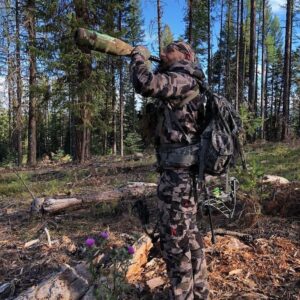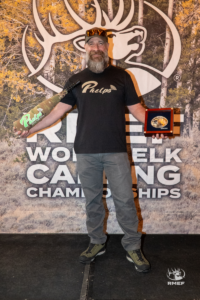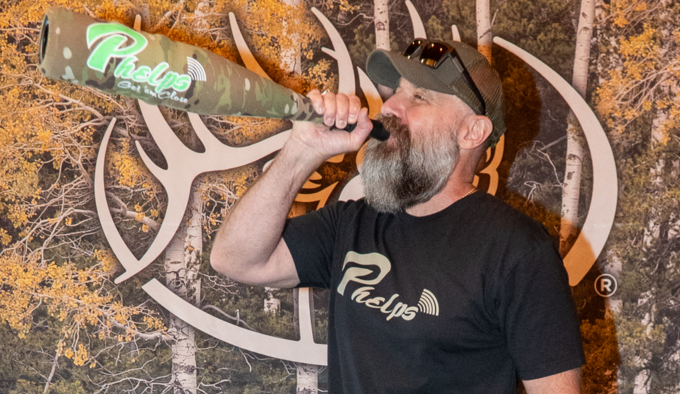by Tom Kuglin/Bugle Hunting & Outdoor Lifestyle Editor
Whether his audience is a panel of judges or a rutted-up bull elk, when Tony Gilbertson rips a bugle or softly mews, he has one simple goal in mind.
“If I’m on stage or in the woods, I’m trying to paint a picture with my calling,” he says.
The resident of Vernonia, Oregon, took his elk-calling artistry to the highest level earlier this month, winning the professional division at the 2024 RMEF World Elk Calling Championships for the first time. Competing against multiple-time winners including Corey Jacobson and Beau Brooks, Gilbertson’s calls reverberated through the event center in Big Sky, Montana, like a herd of elk moving through a stand of aspen.
“I’m still honestly a little bit in disbelief and also extremely grateful for the opportunity that I’ve had both from the Rocky Mountain Elk Foundation and the people that I’ve met,” he says.
Tony works in the public sector from his home in northwest Oregon. Growing up, he started rifle hunting for deer when he turned 12 with his dad, and later dabbled in archery hunting with his future father-in-law. That first exposure to chasing elk showed Gilbertson just how cunning they can be, but calling didn’t enter into the equation until he would meet avid bowhunter Gene Alwine in the late 90s.
“We got up to an area where we knew the elk were and he gave the Primos Hoochie Mamma a squeeze and this bull just comes running in,” Tony says. “Being an inexperienced archer back then and not trusting my camouflage, I made the rookie mistake of setting up behind a tree thinking he would walk past me. Of course that didn’t work out, but, you know, it gave me that idea of what it’s like to have a 700- or 800-pound bull elk come running into a call.”
Tony quickly took to a diaphragm call to make the most realistic and versatile elk sounds possible. He watched videos and loved to practice and call in bulls for others.
“I was really in it for the experience and I like harvesting elk myself, but I get way more satisfaction out of calling in bulls or other people. Needless to say, my buddies never really learned how to call,” he jokes.
Tony heard about the RMEF contest and entered the Men’s Division. His first year in 2005 resulted in a “pretty-darn-good” fourth-place finish. He entered a few more contest with similar results but then took a break for several years. Then in 2021, he decided to enter again, this time winning the Men’s Division.
“I’d been out for a long time and that was pretty amazing,” he says.
Tony signed on as pro-staff at Phelps Game Calls and made the nerve-wracking step up to the Pro Division. But despite any nerves, in 2022 he finished second. After going out early in 2023, Tony came to Big Sky this year with a fine-tuned calling routine. He executed it to a tee in the finals to win the contest.
“The thing about the Pro Division is that it’s not like guys are blowing each other out of the water,” Tony says. “Everyone is a really good caller and any one of those guys could win on any given day in these contests. That day was just my day.”
Calling in contests and calling to elk have plenty of similarities, but Tony pointed out some key differences. In contests, callers must wait to get feedback from judges. In the elk woods, a bull will let you know sometimes instantaneously whether you’re making the right call or not.

And when it comes to calling elk, Tony has developed some techniques that have proven effective for him. First, he always starts with cow calls, and if cow calls are eliciting the response he wants, that’s what he sticks with. Then, Tony always tries to get closer, ideally within 100 yards.
“I love to bugle, I love to listen to bulls bugle, but if they’re not responding to bugles and they’re responding to cow calls, then don’t bugle,” he says. “If I can pinpoint them I’m trying to get in and just listen to see what they’re doing.”
When it comes time for a close-range bugle, it’s time to go aggressive an attempt to elicit that response from a bull to investigate or fight, Tony says. But besides calling, many bowhunters overlook the non-verbal sounds elk make that can lure a bull in close. Whether that’s breaking branches, stripped leaves off a stem or splashing in the water, those can make or break a hunt.
“Every bull is different and you just have to go in there and try a variety of things to see if it works,” Tony says. “There’s skill involved, but, you know, there’s also a lot of luck.”
Tony plans to return next year for the RMEF World Elk Calling Championships. The trophy and the prizes are great, but those wear off compared to the friendships he’s made along the way.
“Those friendships last a lifetime and that’s what’s important to me,” he says.
(Photo credit: Rocky Mountain Elk Foundation/Tony Gilbertson)

